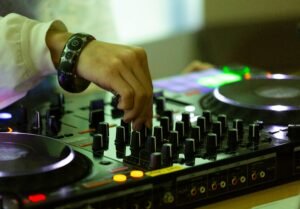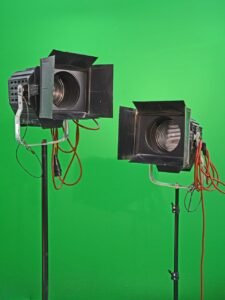Comprehensive Guide of DJing
Overview
DJing is a dynamic and engaging hobby that involves mixing recorded music to create a seamless flow of sound for live audiences or personal enjoyment. DJs use various equipment, including turntables, mixers, and digital software, to manipulate tracks, add effects, and transition between songs. This hobby allows individuals to express their musical tastes, creativity, and technical skills while entertaining others. DJing can encompass various genres, from electronic dance music (EDM) to hip-hop, rock, and pop, making it a versatile pursuit. Many DJs also engage in producing their own music, further expanding their artistic expression. The social aspect of DJing, such as performing at parties, clubs, and events, adds to its appeal, fostering connections with fellow music lovers.
History
The origins of DJing can be traced back to the late 19th and early 20th centuries with the advent of phonographs and radio broadcasting. The term ‘disc jockey’ was coined in the 1930s, referring to radio hosts who played records on air. The 1970s marked a significant turning point for DJing, particularly in the disco scene, where DJs began to mix tracks to keep the dance floor energized. Pioneers like Kool Herc and Grandmaster Flash in the hip-hop community further revolutionized the art of DJing by introducing techniques such as breakbeat mixing and scratching. The rise of electronic music in the 1980s and 1990s led to the emergence of rave culture and the popularity of club DJs, solidifying DJing as a prominent form of entertainment. Today, advancements in technology, such as digital audio workstations and DJ software, have made it easier for enthusiasts to learn and practice the craft.
Popularity and Demographics
DJing has gained immense popularity worldwide, appealing to a diverse demographic of music enthusiasts. According to industry reports, the global DJ market is expected to continue growing, driven by the increasing demand for live music events and festivals. DJing is particularly popular among younger generations, with many aspiring DJs starting in their teens or early twenties. Social media platforms and streaming services have played a crucial role in promoting DJ culture, allowing artists to share their mixes and connect with fans. Additionally, the rise of online tutorials and DJ schools has made the hobby more accessible, encouraging individuals from various backgrounds to explore their passion for music. Events like music festivals and club nights attract large audiences, further solidifying DJing as a vibrant and influential hobby in contemporary culture.
Sponsored Hobbyists and Vendors
Become a Sponsor!
Affiliate Disclaimer: Throughout some sections below, Hobby Spotlight may suggest some tools, equipment or material using affiliate links. By purchasing any of those items, Hobby Spotlight may earn a small commission. This helps fund our website, content and services without directly charging our users.
Getting Started
Essential DJ Equipment:
Beginner
- DJ Controller: A basic DJ controller for mixing music.
- Headphones: Over-ear headphones for monitoring sound.
- Laptop Stand: A portable stand to hold your laptop while DJing.
- USB Flash Drive: A USB drive to store and transfer music files.
- DJ Software: Basic DJ software for mixing tracks.
Intermediate
- Professional DJ Mixer: A more advanced mixer for better sound control.
- Studio Monitors: High-quality speakers for accurate sound playback.
- Microphone: A microphone for announcements and vocals.
- DJ Booth: A portable booth for setting up your DJ equipment.
- Vinyl Records: Vinyl records for traditional DJing and mixing.
Basic Requirements and Initial Setup:
- DJ Equipment: Essential gear includes a DJ controller or turntables, a mixer, headphones, and speakers. This equipment allows for mixing and manipulating music tracks effectively.
- Music Library: A diverse collection of music across various genres is crucial. This can be sourced from digital platforms, vinyl records, or CDs, ensuring a wide selection for different audiences.
- Software: DJ software such as Serato, Traktor, or Rekordbox is necessary for digital mixing. These programs help organize music, create playlists, and apply effects.
Fundamental Skills to Learn:
- Beatmatching: The ability to synchronize the tempo of two tracks for seamless transitions.
- Mixing Techniques: Understanding how to blend tracks using EQ, volume control, and effects to create a cohesive sound.
- Track Selection: Developing an ear for choosing the right tracks that fit the mood and energy of the audience.
- Reading the Crowd: The skill of observing audience reactions to adjust the music selection and energy level accordingly.
- Basic Scratching: Learning fundamental scratching techniques to add flair and creativity to mixes.
Sub-Hobby/Common Activities:
- Live Performances: Playing at clubs, festivals, or private events, showcasing mixing skills and engaging with the audience.
- Remixing: Taking existing tracks and altering them to create a new version, often adding personal flair or different genres.
- Producing Music: Creating original tracks using digital audio workstations (DAWs) and incorporating various elements like beats and melodies.
- Podcasting: Hosting music-related podcasts, sharing mixes, or discussing music trends and industry insights.
- Collaborating with Other Artists: Working with vocalists, musicians, or other DJs to create unique performances or tracks.
Terminology:
- Beatmatching: The technique of aligning the beats of two tracks to ensure a smooth transition.
- EQ (Equalization): Adjusting the balance of different frequency ranges in a track to enhance sound quality.
- Drop: The moment in a track where the music changes dramatically, often leading to a high-energy section.
- Looping: Repeating a section of a track to create a continuous sound or build tension.
- Transition: The method of moving from one track to another, which can involve various techniques like fading or cutting.
- Sample: A portion of a sound recording reused in a different song or piece of music.
- Mixing: The process of combining multiple audio tracks into a single cohesive piece.
- Set: A collection of tracks played by a DJ during a performance.
- Controller: A device that allows DJs to manipulate music software, often featuring knobs, faders, and pads.
- Vinyl: A traditional format for music that many DJs still use for its unique sound quality and tactile experience.
Advanced Topics and Specializations
Advanced Tools and Equipment:
- Digital DJ Controller: A professional-grade controller that integrates with DJ software, offering advanced features like multiple decks and effects.
- High-Quality Headphones: Studio-quality headphones designed for DJs, providing excellent sound isolation and clarity for mixing.
- DJ Mixer: A professional mixer with multiple channels, EQ controls, and effects for seamless transitions and live performances.
- Vinyl Turntable: A high-end turntable for vinyl records, featuring precision engineering for optimal sound quality and playback.
- DJ Software Subscription: Access to advanced DJ software with features like beat matching, looping, and extensive music library management.
Advanced Projects and Achievements:
- Live Event Performance: Successfully DJing at large-scale events, festivals, or clubs, showcasing the ability to read the crowd and create an unforgettable atmosphere.
- Original Music Production: Composing and producing original tracks or remixes that gain recognition in the music community, demonstrating creativity and technical skill.
- Collaborative Mixes: Partnering with other DJs or artists to create unique collaborative mixes that blend different styles and genres, expanding reach and audience engagement.
Advanced Techniques and Methods:
- Beatmatching: Mastering the art of synchronizing the tempo of two tracks to create seamless transitions, enhancing the flow of a set.
- Looping and Sampling: Utilizing loops and samples to create dynamic layers in a mix, adding depth and complexity to the performance.
- Effects Processing: Applying various effects (e.g., reverb, delay, filters) in real-time to manipulate sound and create unique auditory experiences.
Specializations and Niche Areas:
- Genre-Specific DJing: Focusing on specific genres such as techno, house, hip-hop, or drum and bass, developing a deep understanding of the culture and music associated with that genre.
- Mobile DJing: Providing DJ services for private events, weddings, and parties, requiring adaptability and a diverse music library.
- Turntablism: Specializing in the art of manipulating sounds and creating music using turntables and a DJ mixer, often incorporating scratching techniques.
- Digital DJing: Utilizing software and digital controllers to mix music, allowing for innovative techniques and access to vast libraries of tracks.
- Visual DJing: Integrating visual elements and video mixing into performances, creating a multi-sensory experience for the audience.
Future Trends and Innovations:
- Increased use of AI in music selection and mixing, allowing for personalized experiences based on audience preferences.
- Growth of virtual and augmented reality DJing experiences, providing immersive environments for audiences.
- Expansion of live streaming platforms for DJ performances, enabling global reach and interaction with fans.
- Integration of blockchain technology for music rights management and artist compensation.
- Emergence of eco-friendly DJ equipment and practices, promoting sustainability in the music industry.
Technology Integrations:
- DJ Software: Advanced software like Serato, Traktor, and Rekordbox that allows for complex mixing, track organization, and performance enhancements.
- Digital Controllers: Hardware that integrates with DJ software, providing tactile control over mixing and effects.
- Streaming Services: Accessing vast libraries of music through platforms like SoundCloud, Beatport, and Spotify for seamless integration into sets.
- Mobile Apps: Utilizing apps for music discovery, set preparation, and live performance management, enhancing the DJing experience.
- Social Media Integration: Leveraging platforms like Instagram and TikTok for promotion and audience engagement, creating a personal brand as a DJ.
Further Learning and Resources
Books:
- DJing for Dummies by John Steventon: An accessible guide that covers the basics of DJing, including equipment, techniques, and how to create your first mixes.
- How to DJ Right: The Art and Science of Playing Records by Frank Broughton and Bill Brewster: A comprehensive introduction to the art of DJing, offering practical tips and insights into mixing and music selection.
- The DJ Cookbook by DJ D. J. D. J.: A beginner-friendly resource that provides recipes for creating your own mixes, along with tips on equipment and performance.
- Last Night a DJ Saved My Life: The History of the Disc Jockey by Bill Brewster and Frank Broughton: An in-depth exploration of the history and evolution of DJing, perfect for those looking to understand the cultural significance of the craft.
- The Art of DJing by DJ Mag: A detailed guide that covers advanced techniques, including beatmatching, scratching, and live performance strategies for experienced DJs.
- Mixing Secrets for the Small Studio by Mike Senior: While primarily focused on mixing, this book provides valuable insights for DJs looking to enhance their production skills and create polished tracks.
Websites:
- DJ TechTools, https://www.djtechtools.com – A comprehensive resource for DJs, offering tutorials, gear reviews, and community forums.
- Digital DJ Tips, https://www.digitaldjtips.com – Provides online courses, articles, and tips for DJs of all skill levels.
- DJ City, https://www.djcity.com – A leading online store for DJ equipment, with reviews and tutorials on the latest gear.
- Mixmag, https://www.mixmag.net – A popular electronic music magazine featuring news, reviews, and DJ interviews.
- Splice, https://www.splice.com – A platform for music production that offers samples, loops, and collaboration tools for DJs and producers.
Courses:
- DJing for Beginners by Udemy, https://www.udemy.com/course/dj-course-beginners/ – A beginner-friendly course covering the basics of DJing, including equipment and techniques.
- Master DJing with DJ TLM Academy, https://www.djtac.com – Offers a comprehensive course for aspiring DJs, focusing on mixing, scratching, and performance skills.
- Point Blank Music School DJ Courses, https://www.pointblankmusicschool.com – Provides a range of DJ courses from beginner to advanced levels, including online and in-person options.
- Skillshare DJing Classes, https://www.skillshare.com/browse/djing – A variety of project-based classes for DJs, covering different styles and techniques.
- Coursera Music Production by Berklee College of Music, https://www.coursera.org/learn/music-production – While focused on music production, this course includes valuable insights for DJs on mixing and sound design.
Content Creators and Community
Content Creators:
- DJ TLM (YouTube): A DJ and music producer sharing tutorials, tips, and gear reviews, helping aspiring DJs improve their skills and knowledge.
- DJ City (YouTube): A channel dedicated to DJ culture, featuring tutorials, product reviews, and live performances from top DJs around the world.
- DJ TechTools (Instagram): A platform focused on DJ technology, offering tips, tricks, and gear recommendations for DJs of all levels.
- DJ Tech (Twitch): A live streaming DJ showcasing mixes and engaging with the audience, providing a platform for interaction and learning.
- Point Blank Music School (YouTube): Offers comprehensive DJ courses and tutorials, covering everything from basic techniques to advanced mixing skills.
- DJ Mafia (YouTube): Focuses on DJing techniques, music production, and live performance tips, catering to both beginners and experienced DJs.
- It’s Just DJs (Instagram): A community of DJs sharing their mixes, tips, and experiences, fostering collaboration and support among DJs.
Online Forums and Social Media Groups:
- Reddit – /r/DJs: A community for DJs to share tips, ask questions, and discuss gear and techniques.
- Facebook DJ Groups: Various groups where DJs share mixes, advice, and industry news.
- DJ TechTools Forum: A platform for discussing DJ gear, software, and techniques with fellow enthusiasts.
- Instagram Hashtags (#DJing, #DJLife): Follow trending mixes, tips, and DJ culture through popular hashtags.
- SoundCloud Groups: Join groups to share your mixes and discover new music from other DJs.
Local Clubs and Organizations:
- Local DJ Schools: Many cities offer classes and workshops for aspiring DJs to learn skills and techniques.
- Community Music Venues: Host open mic nights and DJ showcases, providing opportunities for local DJs to perform.
- DJ Meetups: Platforms like Meetup.com host local gatherings for DJs to network and share experiences.
- Music Production Clubs: Groups that focus on both DJing and music production, offering collaborative opportunities.
- Local Radio Stations: Often seek guest DJs for shows, providing exposure and experience in a live setting.
Events, Meetups, and Conventions:
- DJ Expo: An annual event featuring workshops, product showcases, and networking opportunities for DJs.
- Local Music Festivals: Many festivals include DJ performances, offering a platform for exposure and networking.
- DJ Competitions: Regional contests that encourage skill development and creative expression among DJs.
- Workshops at Music Conferences: Learn from industry professionals and experienced DJs at various music events.
- Club Nights and DJ Battles: Regular events where DJs can showcase their skills and compete in a friendly environment.
Associated Hobbies
- Music Production: Many DJs also delve into music production, creating their own tracks and remixes. This hobby allows them to express their creativity and develop a deeper understanding of music composition and sound design.
- Sound Engineering: Understanding the technical aspects of sound can enhance a DJ’s performance. This hobby involves learning about audio equipment, mixing techniques, and acoustics, which can improve the overall quality of their sets.
- Event Planning: DJs often take part in organizing events, from small parties to large festivals. This hobby involves coordinating logistics, managing schedules, and ensuring a seamless experience for attendees.
- Music Blogging: Many DJs share their insights and experiences through blogging. This hobby allows them to connect with a wider audience, discuss music trends, and review new tracks or albums.
- Networking: Building relationships within the music industry is crucial for DJs. This hobby involves attending events, collaborating with other artists, and engaging with fans to expand their reach and opportunities.
- Vinyl Collecting: Some DJs have a passion for collecting vinyl records. This hobby not only provides a unique sound quality but also allows them to explore different genres and eras of music.
- Live Streaming: With the rise of digital platforms, many DJs engage in live streaming their sets. This hobby allows them to reach global audiences and interact with fans in real-time.
- Dance and Movement: Understanding dance styles and rhythms can enhance a DJ’s ability to read the crowd. This hobby involves learning different dance forms, which can inform their music selection and mixing techniques.
Cost and Budgeting
Initial Investment and Ongoing Costs:
- Initial Investment: To start DJing, the initial investment can range from $300 to over $2,000, depending on the equipment you choose. A basic setup might include a DJ controller, headphones, and speakers, which can be found for around $300-$600. For more advanced setups, including professional-grade turntables and mixers, costs can escalate to $1,000 or more.
- Ongoing Costs: Ongoing costs for DJing include music subscriptions (like Beatport or SoundCloud Go), which can range from $10 to $30 per month. Additionally, you may need to budget for maintenance of your equipment, replacement parts, and travel expenses if you perform at events. Marketing costs, such as creating a website or promotional materials, can also add to your ongoing expenses.
Budget-Friendly Options:
- Entry-Level Equipment: Look for entry-level DJ controllers that are often bundled with software, providing a cost-effective way to start without needing to invest in multiple pieces of equipment.
- Free Software: Utilize free DJ software like Mixxx or Serato Lite to practice and hone your skills before investing in paid software.
- Renting Equipment: Consider renting equipment for events instead of purchasing everything upfront. Many local music stores offer rental services for DJ gear.
Where to Buy:
- Local Music Stores: These stores often have knowledgeable staff who can help you choose the right equipment and may offer used gear at lower prices.
- Online Retailers: Websites like Sweetwater, Guitar Center, and Amazon provide a wide range of DJ equipment, often with customer reviews to help guide your purchase.
- DJ Equipment Marketplaces: Platforms like Reverb and eBay are great for finding second-hand gear at reduced prices, allowing you to save money while still getting quality equipment.
Money Making
How to Turn the Hobby into a Profession or Side Hustle:
- Mobile DJ Services: Start a mobile DJ business where you provide music and entertainment for events such as weddings, parties, and corporate functions. Invest in quality sound equipment and create a diverse music library to cater to different audiences. Building a strong online presence through social media and a professional website can help attract clients.
- Club DJ: Work as a DJ at local clubs or bars. This often involves networking with venue owners and promoters to secure gigs. Developing a unique style and understanding the crowd’s energy can help you stand out and gain a loyal following.
- DJing Tutorials and Courses: If you have expertise in DJing techniques, consider creating online tutorials or courses. Platforms like Udemy or Skillshare allow you to share your knowledge with aspiring DJs. You can cover topics such as beat matching, mixing, and using DJ software, providing valuable insights to beginners.
- Music Production: Expand your DJing skills into music production. Learn how to create your own tracks and remixes using software like Ableton Live or FL Studio. Once you have a portfolio of original music, you can sell your tracks on platforms like Beatport or SoundCloud, or even license them for use in commercials and films.
- Podcasting or Radio Shows: Use your DJing skills to host a podcast or radio show focused on music. This could involve curating playlists, discussing music trends, or interviewing artists. Monetization can come from sponsorships, listener donations, or advertising, allowing you to turn your passion for music into a profitable venture.
Benefits and Enjoyment
Physical, Mental, and Social Benefits:
- Physical Activity: DJing often involves standing for long periods, moving around, and sometimes even dancing. This physical engagement can improve stamina, coordination, and overall fitness, especially during live performances.
- Mental Stimulation: The process of mixing tracks, understanding beats, and creating transitions requires mental agility and creativity. DJing can enhance cognitive skills, including problem-solving and critical thinking, as DJs must quickly adapt to the crowd’s energy and preferences.
- Social Connection: DJing is inherently a social activity, whether performing at events, collaborating with other musicians, or engaging with fans. It fosters community and connection, allowing DJs to build relationships and networks within the music industry.
Success Stories and Inspirational Examples:
- Calvin Harris: Starting as a bedroom DJ, Calvin Harris has become one of the highest-paid DJs in the world. His success in producing chart-topping hits and headlining major festivals showcases how passion for DJing can lead to a lucrative career.
- Tiesto: Known for his electrifying performances, Tiesto has won numerous awards and is credited with popularizing electronic dance music (EDM) globally. His journey from local DJ to international superstar inspires many aspiring DJs.
- DJ Jazzy Jeff: A pioneer in the hip-hop DJ scene, DJ Jazzy Jeff has influenced countless artists and DJs. His innovative techniques and collaborations with major artists highlight the creative potential within the DJing hobby.
Ways to Enjoy and Grow in the Hobby:
- Experiment with Different Genres: Explore various music styles to expand your skills and find your unique sound. Mixing genres can lead to innovative sets that captivate audiences and enhance your creativity.
- Attend Workshops and Classes: Learning from experienced DJs through workshops or online courses can significantly improve your skills. These educational opportunities provide valuable insights into techniques, equipment, and industry trends.
- Network with Other DJs: Building relationships with fellow DJs can lead to collaborations, gigs, and mentorship opportunities. Attend local events, join online forums, or participate in DJ competitions to connect with others in the community.
Challenges and Solutions
Common Challenges Faced by Hobbyists:
- Cost of Equipment: DJing can require a significant investment in equipment such as mixers, turntables, speakers, and software. Beginners may find it challenging to afford high-quality gear while still wanting to create professional-sounding mixes.
- Learning Curve: Mastering the technical skills needed for DJing, including beatmatching, mixing, and understanding music theory, can be daunting for newcomers. It often requires time and practice to develop these skills effectively.
- Finding Gigs: Aspiring DJs may struggle to find opportunities to perform live, especially when starting out. Building a reputation and networking within the music community can take time and effort.
- Staying Current with Trends: The music industry is constantly evolving, and DJs need to stay updated on the latest music trends, technology, and techniques to remain relevant and appealing to audiences.
Tips for Overcoming These Challenges:
- Start Small: Begin with basic equipment and gradually upgrade as you gain experience and confidence. Consider renting or borrowing gear to minimize initial costs.
- Practice Regularly: Dedicate time to practice mixing and experimenting with different styles. Online tutorials and courses can provide valuable guidance and accelerate your learning process.
- Network and Collaborate: Attend local music events, join DJ communities, and collaborate with other musicians to create opportunities for gigs. Building relationships can lead to more performance opportunities.
- Follow Music Trends: Stay engaged with the music scene by listening to new releases, following industry news, and participating in online forums. This will help you keep your sets fresh and appealing to your audience.
Safety Considerations and Best Practices:
- Ensure your equipment is set up securely to prevent accidents, such as tripping over cables or equipment falling.
- Be mindful of volume levels to protect your hearing. Use ear protection if necessary, especially during long sets.
- Stay hydrated and take breaks during long events to maintain your energy and focus.
- Respect the venue’s rules and regulations, including noise ordinances and equipment usage policies.
- Be aware of your surroundings and the audience to create a safe and enjoyable environment for everyone.
Conclusion and Encouragement
Recap of Key Points:
- DJing is a dynamic and creative hobby that allows individuals to express themselves through music, blending different genres and styles to create unique soundscapes.
- Understanding the equipment is crucial; investing in quality gear such as turntables, mixers, and software can significantly enhance your DJing experience.
- DJing offers opportunities for social interaction, whether at parties, clubs, or community events, allowing you to connect with others who share your passion for music.
- With the rise of digital platforms, aspiring DJs can easily access a vast library of music and tools to hone their skills, making it more accessible than ever.
- Practicing regularly and experimenting with different techniques can help you develop your unique style and improve your performance, leading to greater enjoyment and potential opportunities in the music industry.
Encouragement to Start and Enjoy the Hobby:
- DJing is an inclusive hobby that welcomes everyone, regardless of skill level. You can start with basic equipment and gradually upgrade as you gain experience and confidence.
- It’s a fantastic way to explore your musical tastes and discover new artists and genres, enriching your appreciation for music while having fun.
- DJing can be a rewarding social experience, allowing you to meet new people, collaborate with other musicians, and even perform in front of an audience, creating memorable moments for yourself and others.
Final Tips and Motivational Thoughts:
- Stay open to learning and experimenting with different styles and techniques. The music world is ever-evolving, and embracing change can lead to exciting new opportunities.
- Network with other DJs and music enthusiasts. Building relationships within the community can provide valuable insights, support, and potential collaborations.
- Remember to have fun and enjoy the process. DJing is about sharing your love for music, so focus on creating enjoyable experiences for yourself and your audience.

















